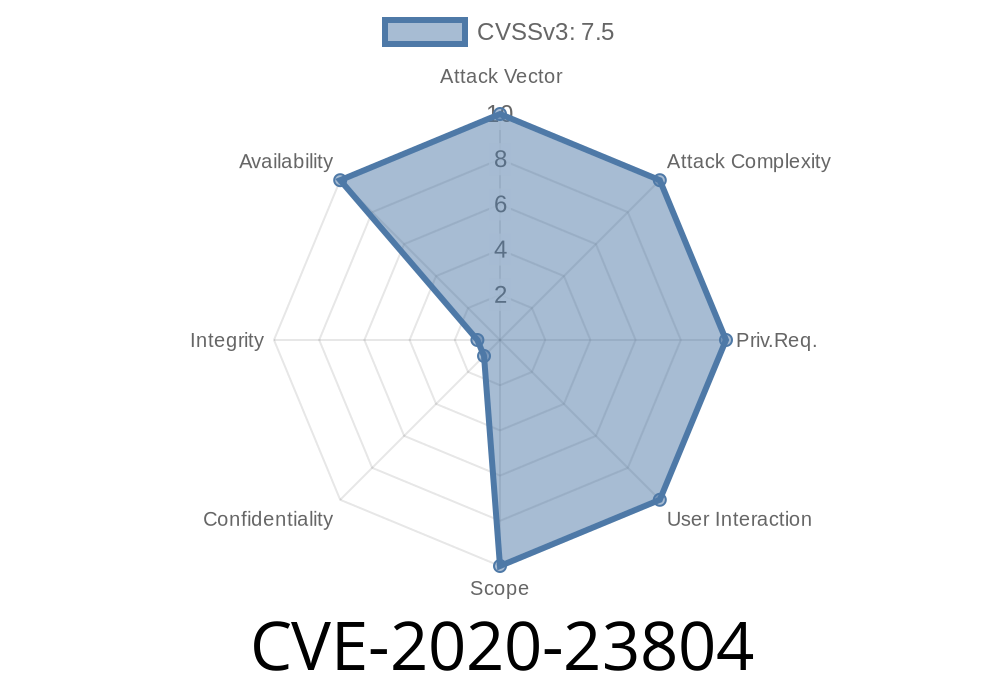The Common Vulnerabilities and Exposures (CVE) database recently identified a critical exploit labeled CVE-2020-23804. The vulnerability resides in two utilities, pdfinfo and pdftops, within the Poppler software package, version .89.. This library is widely used for rendering and processing PDF files. CVE-2020-23804 allows remote attackers to cause a denial-of-service (DoS) situation by submitting crafted input to the affected software application.
In this article, we will delve deep into how this exploit works, including insights into the vulnerable code and attack mechanisms. Along the way, we'll explore code snippets, origin references, and the inner workings of the exploit.
Exploit Details: Uncontrolled Recursion
The vulnerability discovered involves uncontrolled recursion, which occurs when a function repeatedly calls itself without a terminating condition. This ultimately results in an application crash or memory exhaustion due to the system running out of stack space (a type of memory used for function call management).
Typically, recursion is a valid programming method when used with control mechanisms that prevent excessive recursions and out-of-memory situations. However, in the case of CVE-2020-23804, input sanitization was poorly implemented and unsafe recursive function calls were made, making the software susceptible to DoS attacks.
The CVE-2020-23804 vulnerability affects the following components of the Poppler .89. package
1. pdfinfo - A utility that extracts and displays metadata and general information from PDF files.
2. pdftops - A utility for converting PDF files to PostScript format.
Both of these utilities extensively use the Poppler library to parse PDF files for processing, making them prone to the vulnerability.
Code Snippets and Vulnerable Functions
As previously mentioned, the underlying cause for the vulnerability is uncontrolled recursion. This was found in a function within the Poppler library source code. Below is a code snippet highlighting the vulnerable function in the GooString.cc file:
GooString *GooString::insert(int idx, GooString *str) {
if (idx < || idx+w < || length <= idx)
return this;
if (w+str->getLength() > capacity)
expand(length+str->getLength()+1);
if (idx+w > length)
w = length-idx;
for (int j = length-1; j >= idx+w; --j)
p[j + str->w - w] = p[j];
for (int j = ; j < w; ++j)
p[idx + j] = str->p[j];
length += w;
p[length] = '\';
return this;
}
The issue lies in the repeated calls to GooString::insert without proper input validation or termination conditions. As a result, when fed with crafted input exploiting this vulnerability, the function continues calling itself, leading to a stack overflow and a DoS situation.
Exploit Mechanism
An attacker can exploit this vulnerability by crafting a malicious PDF file containing specifically designed metadata. When such a file is processed by the pdfinfo or pdftops utility, the uncontrolled recursion is triggered, causing the software to crash and generate a DoS situation.
It's important to note that this vulnerability does not allow the attacker to execute arbitrary code, steal information, or otherwise compromise the computer system. However, the DoS can result in significant inconvenience and disruption to a user's workflow.
Mitigation and Conclusion
To safeguard against this vulnerability, it's crucial that you update your version of the Poppler library to .90. or later as it incorporates the necessary fixes. In addition, avoid opening PDF files from untrusted sources to reduce the risk of falling victim to CVE-2020-23804-based attacks.
In closing, CVE-2020-23804 exemplifies the importance of robust input validation, proper control mechanisms in recursion, and cautious handling of user-supplied data. Patches are continually released for software vulnerabilities, and it's imperative to stay updated to ensure maximum security and productivity in the digital landscape.
Timeline
Published on: 08/22/2023 19:16:00 UTC
Last modified on: 10/16/2023 14:15:00 UTC
